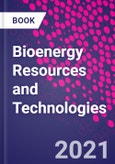Bioenergy Resources and Technologies presents advanced approaches and applications of bioenergy resources, with a strong focus on environmental sustainability. Chapters on the applications of bioenergy, the implementation of bioenergy as an alternative fuel, and future energy security make this an invaluable and unique resource to further advance the field. This book provides new information and novel techniques across a variety of bioenergy applications, with the book's authors addressing key uses for bioenergy resources as an alternative fuel. Various case studies and examples help demonstrate meaning and provide additional clarity.
Social and economic aspects are included for each technology discussed, along with a number of research works and their findings in a diverse mix of areas including energy, environmental science, biotechnology, chemical engineering and mechanical engineering. Researchers and professionals in these disciplines will gain knowledge on the underlying concepts, technologies, fuel applications and solutions to global environmental issues using bioenergy resources.
Please Note: This is an On Demand product, delivery may take up to 11 working days after payment has been received.
Table of Contents
Section 1: Biomass Energy
1. Usefulness of selected annual plants cultivated for more energy content biomass production purposes in a temperate climate
2. Catalytic pyrolysis of biomass using shape selective zeolites for bio-oil enhancement
3. Advance strategies for tar elimination from biomass gasification technique
Section 2: Biogas Energy
4. Biogas: A promising Clean energy technology
5. Potential applications of ionic liquids on gas separation and bio-oil cleaning process
Section 3: Hydrogen Energy
6. Technologies for renewable hydrogen production
7. Hydrogen production from electrolysis: mathematical modelling approach
8. Techno-economic evaluation of hydrogen energy by flow sheeting simulation and economic evaluation
9. Assessment of combined renewable sources and hydrogen storage for residential application
Section 4: Biofuels Energy
10. A comprehensive investigation on the effects of ceramic layering and cetane improver with avocado seed oil biodiesel fuelled diesel engine
11. Effect of low carbon biofuel on carbon emissions in biodiesel fuelled CI engine
12. Life cycle assessment and Techno-economic analysis of photosynthetic microalgae for sustainable biodiesel production
Section 5: Socio-economic Aspect of Bioenergy
13. Social, economic and environmental aspects of bioenergy resources
14. Policies and measures to promote the use of bioenergy resources for sustainable environmental
Authors
Abul Kalam Azad School of Engineering and Technology Central Queensland University, Melbourne Campus, VIC-3000, Australia. Dr. Kalam Azad is a Lecturer at CQUniversity, Melbourne, Australia. His field of interest is renewable energy technologies, energyconversion, and their relevant industrial applications. He has published over a hundred scientific articles, including six edited books
with Elsevier. The recognition of his research has been proved through a high number of citations and h-index both in Scopus and Google
Scholar. He also works as a Section Editor: Sustainable Energy and Energies journal. Currently, he is a member of different professional bodies throughout the world. Mohammad Masud Kamal Khan School of Engineering, Computer and Mathematical Sciences, Auckland University of Technology, Auckland-1010, New Zealand. Professor Masud Khan is currently the Head of the Mechanical Engineering Department at Auckland University of Technology, New
Zealand. He previously served as the Head of Department and School, Deputy Dean Research, School of Engineering and Technology
at Central Queensland University, Australia. His research and teaching interests are in thermofluids engineering, energy-efficient and
environmentally sustainable technologies including production, storage, and performance assessment of renewable energy, hydrogen,
and biofuels produced from various feedstock. He has made significant contributions in research providing fundamental solutions to
many complex projects, engineering education, and academic leadership. He spent three visiting professorial appointments in Canada
and the United States of America. He has over 410 publications including 3 edited books and 27 book chapters.








